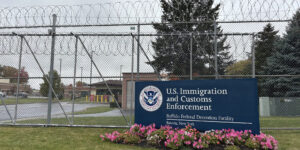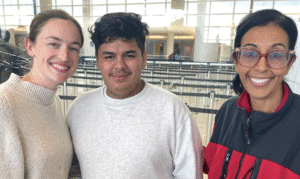WASHINGTON — Civil rights attorneys for Damion Glenroy Davis will present oral arguments before the Third Circuit Court of Appeals on Sept. 7 to end a law that excluded naturalized citizen fathers from passing U.S. citizenship to immigrant children who were born “out of wedlock.” Although the Child Citizenship Act of 2000 (CCA) changed the law to allow custodial U.S.-citizen fathers to automatically transmit their citizenship to their nonmarital children living in the U.S., the law was not made retroactive for children who had already turned 18 years old when the CCA took effect on Feb. 27, 2001.
Mr. Davis is represented by John Peng and Rohmah Javed of Prisoners’ Legal Services of New York and Sarah Gillman and Sarah Decker of Robert F. Kennedy Human Rights. Amici Curiae (Asian Americans Advancing Justice-Atlanta, the National Immigration Project and the Southern Poverty Law Center) are represented by Asian Americans Advancing Justice-Atlanta and the Transnational Legal Clinic of the University of Pennsylvania Carey Law School.
“U.S. citizenship to me means being able to be a husband to my wife and a father to my kids,” said Damion Davis. “Because being able to be there for them and to make sure I put them on the right path is the most important thing to me.”
The prior law’s limitation on father-to-child citizenship transmission was based on Guyer v. Smith, an 1864 Maryland court opinion holding that the children of a white American father and a Black mother from St. Barthelemy had no claim to U.S. citizenship because they were born “out of wedlock.”
Congress later codified the court’s ruling, known as the Guyer Rule, in the Nationality Act of 1940 and recodified it in the 1952 Immigration and Nationality Act (INA), adding a provision to the derivative naturalization statute that allowed naturalized mothers to transfer citizenship to nonmarital children. Naturalized fathers, however, had no ability under the statute to transfer citizenship to their nonmarital children, even if the child was in the father’s full custody.
“At bottom, this case is about family unity. About ensuring that Mr. Davis, who immigrated to this country with his parents when he was 11 years old, who has built a life in this country, and who now has a family of his own in Pennsylvania, is not separated from all he holds dear simply because of Congress’s past, invidious views restricting unwed Black fathers from transmitting citizenship to their children,” stated John Peng, federal litigation and appellate staff attorney for the Prisoners’ Legal Services of New York.
“The Guyer rule perpetuates outdated and discriminatory stereotypes, unfairly penalizing fathers of nonmarital children,” said Sarah Gillman, director of strategic U.S. litigation at Robert F. Kennedy Human Rights. “It’s long past time that it be overturned by Congress or the courts to stop ripping families apart.”
Immigrant rights organizations filed an amicus brief in Mr. Davis’ case describing the former law’s impact on six other individuals who immigrated to the U.S. as children to live with their U.S.-citizen fathers, but now face deportation or were deported because of the Guyer Rule, even though they would have automatically become U.S. citizens under modern legal standards. Their stories underline the tragic and destabilizing effects of the repealed law: continuous rejection, devastating family separations and the permanent exile of nearly lifelong U.S. residents to unfamiliar countries where they have no family or support.
“Both unwed mothers and fathers should have a right to pass citizenship onto their children born abroad. The prior law denying this right only to dads is discriminatory, sexist and unjust — and is based on outdated and overturned immigration policies,” said Peter Isbister, senior lead attorney for SPLC’s Immigrant Justice Project and the SPLC Action Fund. “Black and Brown children are disproportionately impacted, leaving many at risk of being deported from the only country they know. Leaving this law in place is just another form of family separation we all know to be abhorrent. Congress ought to pass the Equal Citizenship for Children Act now.”
“The United States, through its ratification of core international human rights treaties and as a matter of customary international law, is bound to ensure equal treatment of all persons within its jurisdiction, regardless of race, gender, marital status or age. International law requires that the U.S. remedy the Child Citizenship Act’s failure to provide retroactive redress for non-citizens who had turned 18 prior to the law’s enactment, and allow those individuals the same rights and benefits of citizenship afforded to other residents born to citizen parents, father or mother, married or unmarried,” stated Sarah Paoletti, director, Transnational Legal Clinic at the University of Pennsylvania Law School.
Outside of a federal court ruling, the Equal Citizenship for Children Act of 2023 (ECCA) introduced this year by U.S. Reps. Yvette Clarke and Alma Adams would provide another path to fixing this historical wrong by making provisions of the CCA retroactive. The ECCA would grant citizenship to eligible individuals who turned 18 on or before Feb. 27, 2001 and would ensure that individuals born out of wedlock may automatically acquire U.S. citizenship through their custodial U.S.-citizen parent. The ECCA would also allow children conceived through assisted reproductive technologies (ART) to obtain U.S. citizenship through either custodial parent.
“The Equal Citizenship for Children Act (ECCA) would close a critical gap and help meet the needs of modern families by updating the CCA, which was enacted more than 20 years ago,” said Meredyth Yoon, litigation director for Asian Americans Advancing Justice-Atlanta. “Because of the arcane, sexist and racist Guyer Rule, thousands of longtime U.S. residents who otherwise would have become citizens as children remain vulnerable to deportation. Now in their 40s and 50s, many face separation from multiple generations in their families who are U.S. citizens living in the United States, including parents, children and grandchildren. The ECCA would help stop these exceptionally cruel deportations, which have long-lasting, intergenerational effects.”
“The Equal Citizenship for Children Act (ECCA) would help secure citizenship for thousands of people who were unjustly denied citizenship through their fathers because of their parents’ marital status,” said Amber Qureshi, staff attorney at the National Immigration Project. “We urge Congress to pass this law in order to make the provisions of the CCA retroactive at last so that families like Damion Davis and Kevin Silva can stay together.”
Under the Child Citizenship Act of 2000 (CCA), a noncitizen child who comes to the U.S. to live with their naturalized U.S.-citizen parent automatically becomes a U.S. citizen, as well. But Mr. Davis turned 18 before the CCA took effect, meaning he was subject to the discriminatory former law — 8 U.S.C. § 1432(a)(3) — which prevented U.S. citizen fathers (but not U.S. citizen mothers) from passing their citizenship onto foreign-born, non-marital children.
Laws designed to disadvantage children born outside of marriage between the parents have historically been used in our nation to deny rights to people from non-European cultures, particularly Black and Brown people. As the brief filed by Mr. Davis’ attorneys details, the Guyer Rule is unconstitutional because it discriminates based on gender, has a racially discriminatory purpose and has a disproportionate impact on immigrants of color — particularly Black immigrants like Mr. Davis.
# # #
BACKGROUND:
-
Support the Equal Citizenship for Children Act (ECCA)—Listen to the families affected, as they express how their lives would change with the passage of the Equal Citizenship for Children Act (Asian Americans Advancing Justice—Atlanta)
-
Charlotte Man Faces Deportation by Obscure, Racist Immigration Law (1/14/2021)
-
Decades After Being Overturned, Discriminatory Guyer Rule Leads to Deportation of Kevin Silva (2/22/2022)
Asian Americans Advancing Justice-Atlanta is a nonpartisan, nonprofit organization dedicated to protecting the civil rights of Asian Americans, Native Hawaiians and Pacific Islanders (AANHPI), and other marginalized communities in Georgia and the Southeast.
The National Immigration Project (NIPNLG) is a membership organization of attorneys, advocates, and community members who are driven by the belief that all people should be treated with dignity, live freely, and flourish. We litigate, advocate, educate and build bridges across movements to ensure that those who bear the brunt of racist criminal and immigration systems are uplifted and supported. Learn more at www.nipnlg.org. Follow NIPNLG on Facebook, Twitter and Instagram at @NIPNLG.
Robert F. Kennedy Human Rights is a nonpartisan, not-for-profit organization that has worked to realize Robert F. Kennedy’s dream of a more just and peaceful world since 1968. In partnership with local activists, we advocate for key human rights issues— championing change makers and pursuing strategic litigation at home and around the world. And to ensure change that lasts, we foster a social-good approach to business and investment and educate millions of students about human rights and social justice. Follow us on Facebook, Instagram, LinkedIn, TikTok and Twitter: @RFKHumanRights.
The Southern Poverty Law Center is a catalyst for racial justice in the South and beyond, working in partnership with communities to dismantle white supremacy, strengthen intersectional movements and advance the human rights of all people. For more information, visit www.splcenter.org.
Transnational Legal Clinic at the University of Pennsylvania Law School engages law students in the direct representation of individuals in immigration proceedings, while also working with and alongside individuals, organizations, and communities in advocacy addressing the rights of (im)migrants, grounded in principles of international human rights law.
Prisoners’ Legal Services of New York is a nonprofit organization dedicated to providing high-quality and effective legal representation to indigent individuals incarcerated throughout the State of New York. Starting with its founding after the Attica Prison Riot of 1971, PLSNY has strived to secure the civil and human rights of those detained, to advocate for more humane detention conditions, and to achieve a more just criminal justice system.
Media Contacts:
Asian Americans Advancing Justice-Atlanta, James Woo, jwoo@advancingjustice-atlanta.org, 404-585-8446
National Immigration Project, Arianna Rosales, arianna@nipnlg.org, 202-524-9121
The SPLC Action Fund, Anna Núñez, anna.nunez@splcenter.org, 334-201-9236
Robert F. Kennedy Human Rights, Amy Reid, reid@rfkhumanrights.org, 646-678-0575
Prisoner Legal Services of New York, John Peng, jpeng@plsny.org, 518-694-8699
Transnational Legal Clinic, University of Pennsylvania Carey Law School, Sarah Paoletti, paoletti@law.upenn.edu, 215-898-1097




